Simulating the Great British Bake Off
I have just been brought by my wife to watch a show called “The Great British Bake Off”. It is a show where at the beginning of each season, there are 12 bakers taking part. Each week, they show off their baking skills and their cakes. The best baker in each week wins the star baker, while the unlucky one in each week gets eliminated, no matter how good they were in the previous week. By the end of the season, there are only 3 bakers left and the champion and the runner-ups are decided simultaneously. The question I am interested to see is, “would it be advantageous to have mediocre but consistent performance or great skill but inconsistent performance (in a good and a bad way)?” Let’s simulate it with Monte Carlo.
Suppose that the performance of a baker \(i\) is a random variable \(X_i \sim \mathcal{N}(\mu_i, \sigma_i)\) drawn from a Normal distribution with mean \(\mu_i\) and standard deviation \(\sigma_i\). So if a person bakes many times, his/her average performance would be close to \(\mu_i\). If he/she has low \(\sigma_i\), his/her performance would be quite consistent. Otherwise, the performance would involve a lot of surprise. Also assume that the average performance of all people are distributed normally, \(\mu_i \sim \mathcal{N}(0,1)\). So is the standard deviation, \(\sigma_i \sim \mathcal{N}(0,1)\).
To make the simulation easier, let’s make a function to choose \(n\) best bakers given the mean and standard deviation of some bakers.
import numpy as np
def get_best_n_bakers(means, stds, n):
size = means.shape[0]
# get the performance of every person at one time
performance = np.random.randn(size) * stds + means
# only take the top n
idx_topn = np.argsort(performance)[-n:]
means_topn = means[idx_topn]
stds_topn = stds[idx_topn]
return means_topn, stds_topnOne possible scenario
Now let’s follow a possible scenario from the audition stage. The audition stage consists of several processes, including baking. To simplify, just assume that the top 12 bakers are chosen based on their performance on the audition.
Assume there are 100 participants in the audition and the show only 12 best bakers during the audition to be taken to the show. The average performance of a person is assumed to be distributed normally. So is the standard deviation.
means = np.random.randn(100)
stds = np.random.randn(100)
means_top12, stds_top12 = get_best_n_bakers(means, stds, 12)Here’s the performance characteristic of the chosen 12 bakers, in this case.
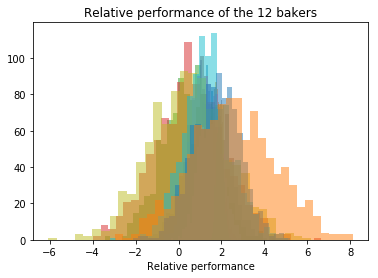
After each week, one unlucky baker will get eliminated until the final where only 3 bakers left. Let’s simulate that.
means_topn, stds_topn = means_top12, stds_top12
# iterate per each week until only 3 bakers left
for n in range(11,2,-1):
means_topn, stds_topn = get_best_n_bakers(means_topn, stds_topn, n)The performance of the finalists look like below.
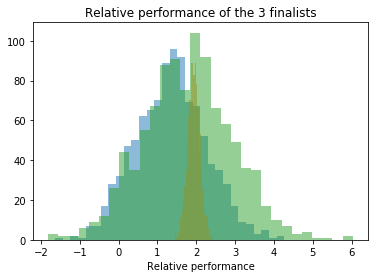
Looking at the picture above, the performance of the finalists might be very different. One has a very large standard deviation (i.e. the green one) and has a very small standard deviation, or a consistent performance (i.e. the orange one). And the winner is …
# get the best baker
means_top, stds_top = get_best_n_bakers(means_topn, stds_topn, 1)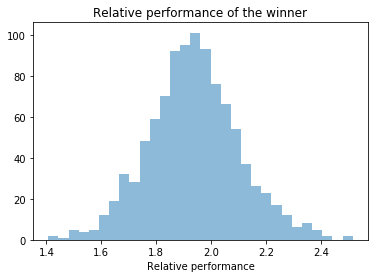
the one who has a consistent performance!
Winners’ characteristics
The previous section just presents one possible scenario. To get a good picture on who has bigger chance in winning the show, let’s run thousands of simulations and visualize the performances from all scenarios.
winner_means = []
winner_stds = []
for _ in range(10000):
# let's assume there are about 100 participants in the audition
means = np.random.randn(100)
stds = np.random.randn(100)
# audition
means, stds = get_best_n_bakers(means, stds, 12)
# elimination weeks
for n in range(11, 2, -1):
means, stds = get_best_n_bakers(means, stds, n)
# final week
means, stds = get_best_n_bakers(means, stds, 1)
# save the winner performance
winner_means.append(means[0])
winner_stds.append(stds[0])Here are the plots.
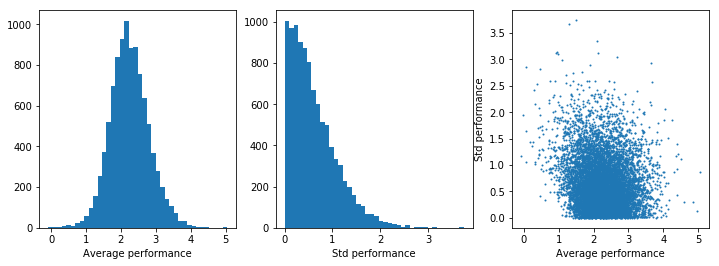
The plot shows that almost all winners have average performance better than people on average (of course) and most winners tend to have consistent performance (i.e. small standard deviation).
The interesting thing is that if there are more participants in the audition, the condition to win the show changes.
winner_means = []
winner_stds = []
for _ in range(10000):
# let's assume there are about 10000 participants in the audition
means = np.random.randn(10000)
stds = np.random.randn(10000)
# audition
means, stds = get_best_n_bakers(means, stds, 12)
# elimination weeks
for n in range(11, 2, -1):
means, stds = get_best_n_bakers(means, stds, n)
# final week
means, stds = get_best_n_bakers(means, stds, 1)
# save the winner performance
winner_means.append(means[0])
winner_stds.append(stds[0])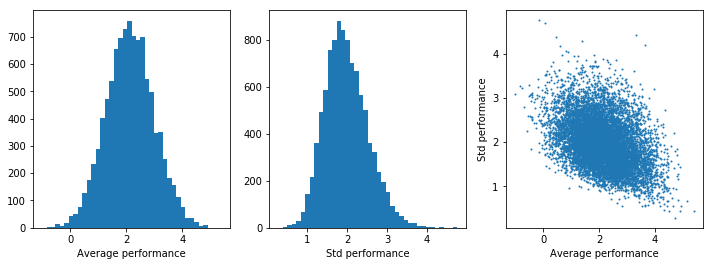
In this case, it is clearly not an advantageous to have a very consistent performance, unless you have very outstanding skill. In case where there are about 10000 participants in the audition stage, you would need more than average skills (not necessarily outstanding) and some bit of luck and surprise.
Any thoughts?